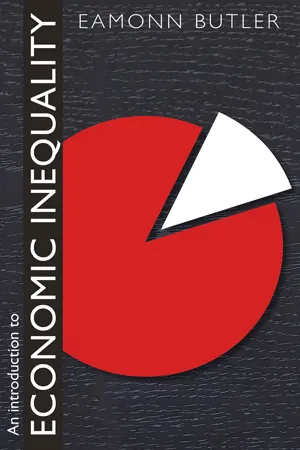
- English
- ePUB (mobile friendly)
- Available on iOS & Android
An Introduction to Economic Inequality
About this book
If you could instantly make the world's poor twice as rich – but at the same time make the world's rich twice as prosperous – wouldn't you do it? This intriguing question lies at the core of An Introduction to Economic Inequality. Inequality has been blamed for many things, from causing lower life expectancy, poor education and political instability, to sparking more suicide, obesity, mental illness and murders. And the claim that the world's richest 1% own 40% of the planet's wealth – and that the rich keep getting richer – is regularly used to demonstrate its evils. But here author Eamonn Butler challenges this widely accepted narrative. Are we, he asks, posing the right questions? Don't the vagaries of life dictate that people are separated by different abilities, different choices, different risks, and different luck? And should equality even be a goal in itself? Butler contends that we should instead address the real social, economic and political problems that seriously harm the lives of the poor. Fixing failing schools, he says, would do more to boost mobility and equality than any amount of income redistribution. And he argues that focusing on inequality loses sight of what's truly important: not that everyone should be equal, but that everyone should have access to a decent standard of living. This clear-sighted yet concise critique makes for a compelling and constructive contribution to the debate on one of the 21st century's most emotive topics.
Frequently asked questions
- Essential is ideal for learners and professionals who enjoy exploring a wide range of subjects. Access the Essential Library with 800,000+ trusted titles and best-sellers across business, personal growth, and the humanities. Includes unlimited reading time and Standard Read Aloud voice.
- Complete: Perfect for advanced learners and researchers needing full, unrestricted access. Unlock 1.4M+ books across hundreds of subjects, including academic and specialized titles. The Complete Plan also includes advanced features like Premium Read Aloud and Research Assistant.
Please note we cannot support devices running on iOS 13 and Android 7 or earlier. Learn more about using the app.
Information
Table of contents
- About the author
- Acknowledgements
- Summary
- 1 The inequality debate
- 2 Definitions, measures, explanations
- 3 Questioning the measurement of incomes
- 4 Questioning the measure of wealth
- 5 International comparisons
- 6 Must the rich get richer?
- 7 Questioning the moral case
- 8 Questioning the practical claims
- 9 Equal pay in the workplace
- 10 The roots of equalisation policy
- 11 Political approaches to equalisation
- 12 Equality of opportunity
- 13 Redistribution policies
- 14 Democracy and equality
- 15 Barriers to equality
- 16 The role of inequality
- 17 Conclusion
- References
- About the IEA